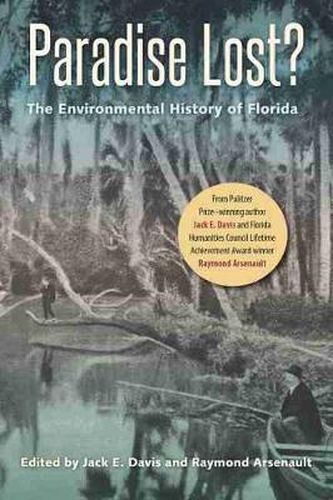Readings Newsletter
Become a Readings Member to make your shopping experience even easier.
Sign in or sign up for free!
You’re not far away from qualifying for FREE standard shipping within Australia
You’ve qualified for FREE standard shipping within Australia
The cart is loading…






This title is printed to order. This book may have been self-published. If so, we cannot guarantee the quality of the content. In the main most books will have gone through the editing process however some may not. We therefore suggest that you be aware of this before ordering this book. If in doubt check either the author or publisher’s details as we are unable to accept any returns unless they are faulty. Please contact us if you have any questions.
From the earliest descriptions of the state’s natural beauty to the degradation of the Everglades, virtually every facet of Florida environment is included in Paradise Lost? Nor have the authors neglected the human side of the story, from William Bartram, Marjory Stoneman Douglas, and Archie Carr to various development boosters and bureaucrats… . A fine collection that will make an important contribution to environmental history generally and to the history of Florida in particular. –Timothy Silver, Appalachian State University
A magnificent contribution to Florida’s environmental history and a fascinating analysis of ‘paradise lost’ in the land of the pink flamingos and Disney. –Carolyn Johnston, Eckerd College
This collection of essays surveys the environmental history of the Sunshine State, from Spanish exploration to the present, and provides an organized, detailed overview of the reciprocal relationship between humans and Florida’s unique peninsular ecology. It is divided into four thematic sections: explorers and naturalists; science, technology, and public policy; despoliation; and conservationists and environmentalists. The contributors describe the evolving environmental policies and practices of the state and federal governments and the dynamic interaction between the Florida environment and many social and cultural groups including the Spanish, English, Americans, southerners, northerners, men, and women. They have applied historical methodology and also drawn on the methodologies of the fields of political science, cultural anthropology, and sociology.
Of obvious value to environmentalists and general readers interested in Florida’s history, exploration, and development, the book will also serve as a solid introduction to the subject for undergraduates and graduate students.
$9.00 standard shipping within Australia
FREE standard shipping within Australia for orders over $100.00
Express & International shipping calculated at checkout
This title is printed to order. This book may have been self-published. If so, we cannot guarantee the quality of the content. In the main most books will have gone through the editing process however some may not. We therefore suggest that you be aware of this before ordering this book. If in doubt check either the author or publisher’s details as we are unable to accept any returns unless they are faulty. Please contact us if you have any questions.
From the earliest descriptions of the state’s natural beauty to the degradation of the Everglades, virtually every facet of Florida environment is included in Paradise Lost? Nor have the authors neglected the human side of the story, from William Bartram, Marjory Stoneman Douglas, and Archie Carr to various development boosters and bureaucrats… . A fine collection that will make an important contribution to environmental history generally and to the history of Florida in particular. –Timothy Silver, Appalachian State University
A magnificent contribution to Florida’s environmental history and a fascinating analysis of ‘paradise lost’ in the land of the pink flamingos and Disney. –Carolyn Johnston, Eckerd College
This collection of essays surveys the environmental history of the Sunshine State, from Spanish exploration to the present, and provides an organized, detailed overview of the reciprocal relationship between humans and Florida’s unique peninsular ecology. It is divided into four thematic sections: explorers and naturalists; science, technology, and public policy; despoliation; and conservationists and environmentalists. The contributors describe the evolving environmental policies and practices of the state and federal governments and the dynamic interaction between the Florida environment and many social and cultural groups including the Spanish, English, Americans, southerners, northerners, men, and women. They have applied historical methodology and also drawn on the methodologies of the fields of political science, cultural anthropology, and sociology.
Of obvious value to environmentalists and general readers interested in Florida’s history, exploration, and development, the book will also serve as a solid introduction to the subject for undergraduates and graduate students.